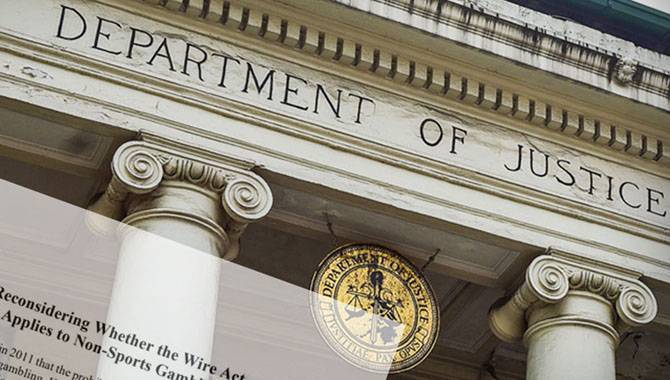Tim Poole explains the DOJ's Wire Act opinion reversal in layman's terms
Plenty was said about the Federal Wire Act in January. Since the US Department of Justice (DoJ) reversed its opinion on the law, there’s been an array of analysis, some overreaction and some sheer misreporting.
What is the Wire Act?
The Wire Act was formed in 1961 and outlawed all interstate wagers placed – or information passed on pertaining to wagers – via telephone or wired communication facility. It was designed, first and foremost, to prevent match-fixing and collusion. John F. Kennedy was US President at the time and aimed to help the DoJ tackle organised crime and trafficking. Match-fixing, of course, is an issue North America’s major sports leagues are still nervous about in light of the repeal of the Professional and Amateur Sports Protection Act (PASPA).
In September 2011, the DoJ revisited the Wire Act and interpreted it as legislation which only applies to sports betting. But in its new opinion, issued on 2 November 2018 and made public last month, the DoJ revised that outlook, judging the law as applicable to all forms of gambling – including online casino, poker and lottery.
An excerpt from the original law shows why there is still lingering doubt as to what its language actually conveys:
“Whoever being engaged in the business of betting or wagering knowingly uses a wire communication facility for the transmission in interstate or foreign commerce of bets or wagers or information assisting in the placing of bets or wagers on any sporting event or contest, or for the transmission of a wire communication which entitles the recipient to receive money or credit as a result of bets or wagers, or for information assisting in the placing of bets or wagers, shall be fined under this title or imprisoned not more than two years, or both.”
In other words, it’s not exactly bedtime reading material.
How does this impact the PASPA repeal?
While the announcement has triggered a variety of different responses, the first note to emphasise is that the Wire Act focuses on interstate communications. That means gaming conducted within individual states, in theory, remains unaffected – as does sports betting within individual states.
The fact sports wagering was already covered by the Wire Act is the best example of this: states are free to legalise sports betting and will continue to be. As the DoJ deliberates over the Wire Act, the American Gaming Association (AGA) estimates as many as 15 states are getting closer to legalising sports betting. AGA-commissioned research also suggested $6bn would be wagered on this year’s Super Bowl.
What is affected?
Some analysts, meanwhile, claim there is nothing more to the DoJ’s new view except a moral victory for casino owner Sheldon Adelson and the Coalition to Stop Internet Gambling
Some analysts, meanwhile, claim there is nothing more to the DoJ’s new view except a moral victory for casino owner Sheldon Adelson and the Coalition to Stop Internet Gambling
Where the DoJ’s new interpretation of the Wire Act may take effect is when there are interstate compacts in place. In Nevada, one such agreement exists.
In the wake of the DoJ’s new opinion going public, Becky Harris, outgoing Chair of the Nevada Gaming Control Board, said: “There is an interstate compact between Nevada, Delaware and New Jersey, where Nevada participates with regard to poker only, and that’s [now] in question.”
However, former Senator Ray Lesniak, a long-time advocate of legalised sports betting, believes there could be even further-reaching implications in New Jersey. He is quoted as saying: “If I go online to gamble on my phone [and] my internet connection goes through a transmitter out of the state, that can be considered a violation of the Wire Act. Same thing with payment processes.”
How can it be implemented?
Initially, the DoJ said it will wait 90 days to implement its new opinion. However, it is unclear whether it will eventually have any direct bearing on existing legislation. How exactly can and will it be implemented?
Legal experts say casino operators and online lotteries will contest the issue in court. Some analysts, meanwhile, claim there is nothing more to the DoJ’s new view except a moral victory for casino owner Sheldon Adelson and the Coalition to Stop Internet Gambling. Adelson has long been a campaigner against online gaming within the US market. As a major player within the land-based sector, what he stands to gain from limiting the success of digital gaming is clear to see.
How has the industry reacted?
Plenty within gaming are continuing to go about their business as they would have done previously; a stance best embodied by the AGA. Sara Slane, AGA Senior Vice President of Public Affairs, said: “It is unfortunate the DoJ departed from well-established practice in reversing its previous opinion without a compelling reason to do so.
“However, the 2018 OLC opinion does not impact the ability for states and tribes to legalise and regulate gaming on a state-by-state and tribal basis, or for companies to provide the exciting products and entertainment experiences our customers want.”
But, in New Jersey, Lesniak believes the ramifications of the DoJ’s new opinion could be “disastrous,” as multiple online sportsbooks depend on payment methods which involve out-of-state transactions. Some commentators have also questioned the AGA’s response, suggesting the trade body could have been far more vocal in its Wire Act statement. When contacted by Gaming America on the matter, the AGA said it is carefully reviewing the new opinion’s implications before adding further comment.
Where do we go from here?
In that sense, the AGA is not alone. As is so often the case with a contentious issue that sparks such polarising views, we can only wait and see which side of the argument takes centre stage in practice. If a player in New Jersey wagering through a New Jersey online operator still counts as a breach of the Wire Act, the implications may be far wider reaching than many originally feared. Therein lies a key distinction.
Does the Wire Act encompass the internet, rather than the Unlawful Internet Gambling Enforcement Act of 2006? Is the DoJ’s new opinion simply an attempt to stay relevant without the authority to genuinely act? Will this new ruling prove a game-changer, or merely be lost to history as a meaningless footnote?
At the heart of the issue, these are the questions gaming companies need to be asking.


